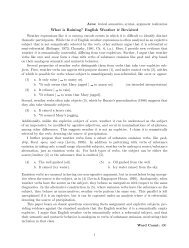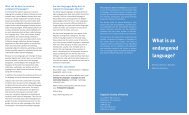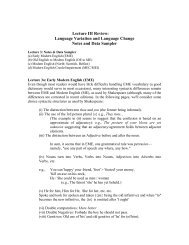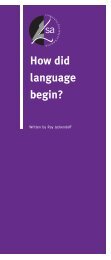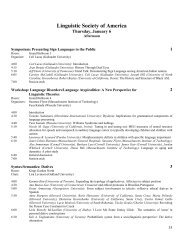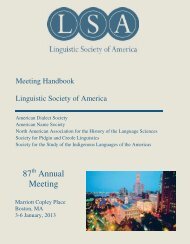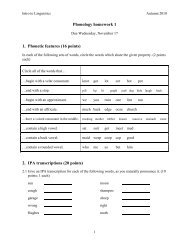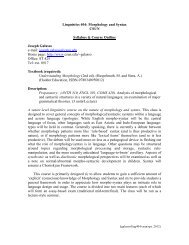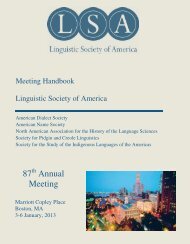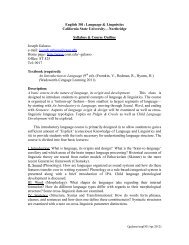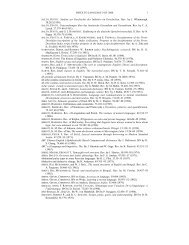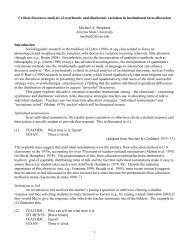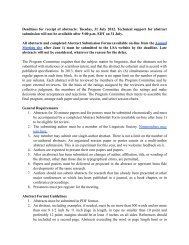Laura Buszard-Welcher (The Rosetta Project)Best practice in your back pocket: Getting <strong>the</strong> most out <strong>of</strong> <strong>the</strong> tools you haveDr. Buszard-Welcher, co-director <strong>of</strong> <strong>the</strong> Rosetta Project, outlines <strong>the</strong> goals <strong>of</strong> this tutorial, including an overview <strong>of</strong> <strong>the</strong> typical pathfollowed in <strong>the</strong> production <strong>of</strong> texts and datasets in language documentation--transcription, translation, annotation, interlinearization,and creation <strong>of</strong> datasets for resources such as lexicons. She introduces recommendations for best practice with respect to text anddatabase formats, explaining briefly <strong>the</strong> value <strong>of</strong> using well-defined XML tagging. She also defines good practice recommendationsthat are within <strong>the</strong> capabilities <strong>of</strong> all linguists, even those who don't have <strong>the</strong> time to master new tools.Deborah Anderson (University <strong>of</strong> California, Berkeley)A field linguist's guide to UnicodeDr. Anderson is co-founder <strong>of</strong> a Unicode Working Group at Berkeley, liaison to <strong>the</strong> Unicode consortium, and overseer <strong>of</strong> <strong>the</strong> ScriptEncoding Initiative. Unicode is essentially a massive extension <strong>of</strong> <strong>the</strong> ASCII character set which provides a unique encoding forevery character, including characters for non-Western languages and <strong>the</strong> IPA. This means that, in principle, any Unicode font willappear <strong>the</strong> same on every platform and in every program. Dr. Anderson explains how Unicode works, how to find and form <strong>the</strong>characters needed for a particular language, and how to request that a character be added to Unicode.Michael Appleby (The LinguistList)How to use Unicode on your computerMr. Appleby, Managing Editor <strong>of</strong> <strong>the</strong> LinguistList, demonstrates how to set up a computer keyboard so that one can easily typeUnicode IPA characters and graphemes for practical orthographies. Most modern operating systems include Unicode fonts wi<strong>the</strong>xtensive character sets, and a variety <strong>of</strong> options exist for inputting nonstandard characters. But, when one cannot input Unicodedirectly, alternative strategies can be employed. Mr. Appleby covers both ‘easy’ and ‘difficult’ scenarios, allowing linguists to use <strong>the</strong>tools <strong>the</strong>y want while ensuring <strong>the</strong>ir characters are encoded with <strong>the</strong> future in mind.Jessica Boynton (Eastern Michigan University)Transcription, time-alignment, & annotationMs. Boynton is a member <strong>of</strong> <strong>the</strong> Chaco Languages Documentation Project, directed by Drs. Veronica Grondona and Lyle Campbell.She presents two good-practice tools for making transcriptions and annotations for audio and video recording--Transcriber and ELAN.Both programs enable linguists to segment long duration audio and video recordings; transcribe <strong>the</strong>m; and label speech turns, topicchanges, and acoustic conditions. ELAN fur<strong>the</strong>r allows <strong>the</strong> user to define time-aligned annotation tiers and supports input <strong>of</strong>interlinearized texts from Shoebox. Among o<strong>the</strong>r things, Ms Boynton demonstrates how to open files, define annotation tiers, andtranscribe data using <strong>the</strong>se programs.Naomi Fox (University <strong>of</strong> Utah)Using Filemaker Pro to produce archivable language documentationMs. Fox presents <strong>the</strong> data management programs and policies developed for <strong>the</strong> Xinka Language Documentation Project. Shedemonstrates how a product intended for commercial use (<strong>the</strong> FileMakerPro database program) can be adapted for documentarylinguistic purposes. Doing this requires an understanding <strong>of</strong> <strong>the</strong> strengths and weaknesses <strong>of</strong> <strong>the</strong> tool and <strong>the</strong> development <strong>of</strong>workflows that result in <strong>the</strong> creation <strong>of</strong> archivable materials. Many <strong>of</strong> <strong>the</strong> lessons learned here will be applicable to <strong>the</strong> use <strong>of</strong> o<strong>the</strong>rpopular commercial programs such as Micros<strong>of</strong>t Excel.Connie Dickinson (Max Planck Institute for Psycholinguistics, Nijmegen/University <strong>of</strong> San Francisco, Quito)The Tsafiki text factoryDr. Dickinson and <strong>the</strong> Tsafiki community language documentation team have recorded, transcribed, translated, and Shoeboxed over120 hours <strong>of</strong> audio and video recordings. Shoebox supports <strong>the</strong> creation <strong>of</strong> a linked set <strong>of</strong> databases for linguistic research and <strong>the</strong>interlinearization <strong>of</strong> texts. While Shoebox is widely used by documentary linguists, it is not easy to learn; it is, however, <strong>the</strong> bestoption currently available for interlinearizing texts and using those texts as <strong>the</strong> basis for dictionary creation. Dr. Dickinson shares tipsfor mastering this useful, but frustrating, program, and shows why it's worth <strong>the</strong> effort.74
Thursday, 4 JanuarySymposiumContinuing To Build <strong>Linguistic</strong> Knowledge for Teachers:Collaborating with NCTE's Commission on LanguageCalifornia C4:00 – 5:30 PMOrganizer:Sponsor:Participants:Kristin Denham (Western Washington University)Committee on Language in <strong>the</strong> School CurriculumLauri Katz (Ohio State University)Dolores Straker (Raymond Walters College, University <strong>of</strong> Cincinnati)Jerrie Cobb Scott (University <strong>of</strong> Memphis)Collaboration between linguists and educators continues to emerge on a national scale, producing work that aims to identify, first,what aspects <strong>of</strong> linguistic knowledge are most useful for teachers to know, and second, what kinds <strong>of</strong> activities and projects are mosteffective in introducing those aspects <strong>of</strong> linguistic knowledge to students. The importance <strong>of</strong> raising language awareness in <strong>the</strong>schools is reflected in <strong>the</strong> National Council <strong>of</strong> Teachers <strong>of</strong> English (NCTE)'s 1994 Position Statement on Language Study:Resolved, that <strong>the</strong> National Council <strong>of</strong> Teachers <strong>of</strong> English appoint a committee or task force to explore effective ways <strong>of</strong> integratinglanguage awareness into classroom instruction and teacher preparation programs, review current practices and materials related tolanguage awareness, and prepare new materials for possible publication by NCTE. Language awareness includes examining howlanguage varies in a range <strong>of</strong> social and cultural settings; examining how people's attitudes vary towards language across culture,class, gender, and generation; examining how oral and written language affects listeners and readers; examining how ‘correctness’in language reflects social-political-economic values; examining how <strong>the</strong> structure <strong>of</strong> language works from a descriptive perspective;and examining how first and second languages are acquired.A similar commitment is reflected by <strong>the</strong> work <strong>of</strong> <strong>the</strong> <strong>Linguistic</strong> <strong>Society</strong> <strong>of</strong> <strong>America</strong> (LSA) Committee on Language in <strong>the</strong> SchoolCurriculum, which explores ways to foster collaboration between linguists and K-12 educators through various projects that targetlanguage education. The NCTE's and LSA's mutual interest in raising language awareness in <strong>the</strong> schools is resulting in importantcollaborative efforts between <strong>the</strong>se pr<strong>of</strong>essional organizations. Members <strong>of</strong> <strong>the</strong> LSA were invited to attend <strong>the</strong> 2003 annual NCTEconvention, where <strong>the</strong>y presented a well-attended panel on linguistics and education. The NCTE invited LSA members again in 2005and 2006 to present at <strong>the</strong> NCTE convention. At a <strong>meeting</strong> <strong>of</strong> linguists, teachers, teacher educators, and <strong>the</strong> Center for Applied<strong>Linguistic</strong>s held at <strong>the</strong> NCTE in 2005, several NCTE members expressed interest in working more directly with <strong>the</strong> LSA, resulting injoint ownership <strong>of</strong> some <strong>of</strong> <strong>the</strong> projects and a sense <strong>of</strong> mutuality and reciprocity. This collaboration will lead to better ways forlinguists' efforts in <strong>the</strong> integration <strong>of</strong> linguistic knowledge into preK-12 education to be anchored in <strong>the</strong> K-12 classroom. In thissymposium, NCTE/LSA members <strong>of</strong>fer insight into how best to direct our work with NCTE in order to effect change in <strong>the</strong> ways thatlinguistics is integrated into preK-12 classrooms by focusing on ways that linguists can better prepare teachers, as well as suggestwhat role linguists might play in making and changing educational policy.Laurie Katz (Ohio State University)Discourse analysis & teachers' knowledge <strong>of</strong> variations in narrativesI discuss how linguists and teacher educators can work toge<strong>the</strong>r to support teachers <strong>of</strong> children from preschool to second grade tointegrate children's language variations into <strong>the</strong> curriculum while at <strong>the</strong> same time addressing <strong>the</strong> curriculum standards. I discussexamples through one <strong>of</strong> <strong>the</strong> Ohio English Language Arts Standards which has shared characteristics with <strong>the</strong> NCTE/IRA EnglishLanguage Arts Standards. Examples include developing curriculum for pre- and in-service teachers with a focus on (1) helping <strong>the</strong>mto identify narrative structures, styles, and content within <strong>the</strong> children's oral discourse and (2) interpreting <strong>the</strong> standards in a manner tosupport children's home language while teaching <strong>the</strong>m a standardized format.75
- Page 1:
MEETING HANDBOOKLINGUISTIC SOCIETY
- Page 5 and 6:
Meeting RoomsSECOND FLOORFOURTH FLO
- Page 7:
• LSA: Business Meeting and Award
- Page 11 and 12: LSAThursday, 4 JanuaryEveningWelcom
- Page 13 and 14: Friday MorningLSAConstructions and
- Page 15 and 16: LSAFriday, 5 JanuaryAfternoonInvite
- Page 17 and 18: Friday AfternoonLSAModeling Acquisi
- Page 19 and 20: LSARules for Motions and Resolution
- Page 24 and 25: LSASaturday AfternoonSymposium: Par
- Page 26 and 27: LSASaturday AfternoonSyntactic Face
- Page 28 and 29: LSASunday MorningFirst Language Acq
- Page 30 and 31: American Dialect SocietyThursday, 4
- Page 32 and 33: ADSSaturday, 6 JanuaryMorningSessio
- Page 34 and 35: American Name SocietyThursday, 4 Ja
- Page 36 and 37: ANSFriday AfternoonForms of Address
- Page 38 and 39: ANSSaturday AfternoonHistorical Ono
- Page 40 and 41: Society for Pidgin and Creole Lingu
- Page 42 and 43: SPCLSaturday, 6 JanuaryMorningSpeci
- Page 44 and 45: Society for the Study of the Indige
- Page 46 and 47: SSILAFriday AfternoonPhonology and
- Page 48 and 49: SSILASunday, 7 JanuaryMorningSemant
- Page 50 and 51: Part 1: Thursday, 4 JanuaryPart 2:
- Page 52 and 53: Donca Steriade (Massachusetts Insti
- Page 54 and 55: Friday, 5 JanuaryPlenary AddressCal
- Page 56: Saturday, 6 JanuaryPresidential Add
- Page 59: Thursday, 4 JanuaryTutorialA Field
- Page 63 and 64: Friday, 5 JanuarySymposiumApproache
- Page 65 and 66: Friday, 5 JanuaryDigital Poster Ses
- Page 67 and 68: Stephen R. Anderson (Yale Universit
- Page 69 and 70: David Bowie (University of Central
- Page 71 and 72: Sharon Peperkamp (CNRS/University o
- Page 73 and 74: Elena Guerzoni (University of South
- Page 75 and 76: Claire Bowern (Rice University)Morp
- Page 77 and 78: Lise Dobrin (University of Virginia
- Page 79 and 80: We discuss the analysis of the vowe
- Page 81 and 82: Brian Agbayani (California State Un
- Page 83 and 84: squiggly shapes). Disfluency made n
- Page 85 and 86: Adam Baker (University of Arizona)
- Page 87 and 88: final particle; this structure enco
- Page 89 and 90: Travis G. Bradley (University of Ca
- Page 91 and 92: demonstrated that 2-year-olds map n
- Page 93 and 94: Nancy J. Caplow (University of Cali
- Page 95 and 96: Sarah Churng (University of Washing
- Page 97 and 98: Jennifer Culbertson (Johns Hopkins
- Page 99 and 100: Scott Drellishak (University of Was
- Page 101 and 102: Marc Ettlinger (University of Calif
- Page 103 and 104: Scherre 2001 argue that the phenome
- Page 105 and 106: Cynthia A. Fox (University at Alban
- Page 107 and 108: structures to the double object con
- Page 109 and 110: Steven Gross (East Tennessee State
- Page 111 and 112:
Heidi Harley (University of Arizona
- Page 113 and 114:
equivalents. I argue that their sim
- Page 115 and 116:
predictable, and/or restricted in d
- Page 117 and 118:
Keith Johnson (University of Arizon
- Page 119 and 120:
Andrew Kehler (University of Califo
- Page 121 and 122:
comparative rate of acquisition acr
- Page 123 and 124:
Pei-Jung Kuo (University of Connect
- Page 125 and 126:
EunHee Lee (University at Buffalo,
- Page 127 and 128:
Brook Danielle Lillehaugen (Univers
- Page 129 and 130:
Martha J. Macri (University of Cali
- Page 131 and 132:
Spanish subjects with unaccusative
- Page 133 and 134:
Brad Montgomery-Anderson (Universit
- Page 135 and 136:
multi-ethnic configuration, and pos
- Page 137 and 138:
Natalie Operstein (University of Ca
- Page 139 and 140:
Nick Pharris (University of Michiga
- Page 141 and 142:
Anastasia Riehl (Cornell University
- Page 143 and 144:
Françoise Rose (CNRS-IRD) Session
- Page 145 and 146:
precedence also constrains stative
- Page 147 and 148:
use experimental and corpus techniq
- Page 149 and 150:
eads easily for astrophysicists.).
- Page 151 and 152:
domains of use are mostly complemen
- Page 153 and 154:
show that both concatenative and no
- Page 155 and 156:
Don Walicek (University of Puerto R
- Page 157 and 158:
positions. However, certain matrix
- Page 159 and 160:
Suwon Yoon (University of Chicago)



